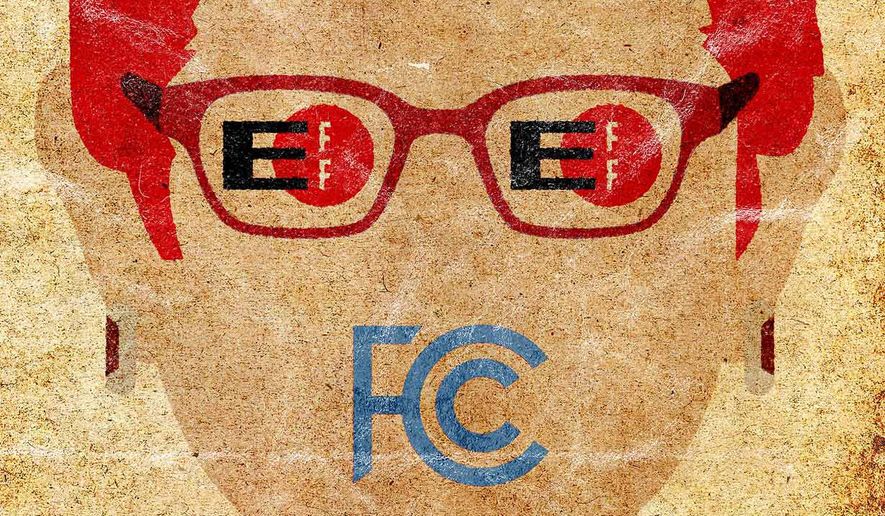OPINION:
Information integrity and intellectual property rights (IPR) are emerging as front lines in the increasingly diverse and complex national security threats confronting America — and both fall under the authority of the Federal Communication Commission (FCC).
This new reality makes the Biden administration’s nomination of Gigi Sohn to the FCC all the more troubling given her track record of disregard for our sensitive secrets and outright hostility to intellectual property, which could dangerously empower America’s enemies namely Russia and China, if she is confirmed. She is an utterly inappropriate choice, and the administration should withdraw her nomination straight away.
Unauthorized release of classified information is a federal crime in the United States, and over the last decade, two significant leaks of government information carried out by NSA contractor Edward Snowden and Army private Chelsea Manning have directly undermined the safety of the American people as sensitive information enabled our adversaries to target U.S. soldiers and our allies in Afghanistan. The senior-most military leaders in our country — serving under Presidents from both parties — have testified as much to the U.S. Congress.
The Snowden and Manning leaks should be front and center again as Ms. Sohn’s nomination is considered because she serves as a board member and champion of the Electronic Frontier Foundation (EFF), which has been outspokenly supportive of her nomination. EFF has a long history of supporting leakers of classified information, including Snowden and Manning. EFF urged for the Manning pardon —even filing a court brief in her support — and continues to advocate for a Snowden pardon. EFF has given Snowden and Manning — and Ms. Sohn — their Pioneer Award, the ostensible purpose of which is to recognize “leaders on the electronic frontier who are extending freedom and innovation in the realm of information technology,” but in practice lionizes anti-American leakers. For his part, Snowden displayed an “EFF” sticker on his laptop case from his safe harbor in Russia when EFF gave him a platform to share his views, in what they disingenuously termed a “fireside chat” with an “NSA Whistleblower.”
The EFF has this backward: Whistleblowers are courageous citizens exposing malfeasance and corruption who merit the protection of the American legal and justice system. Edward Snowden is a criminal living in a hidden location in Russia under the protection of Vladimir Putin, who exploits his treachery against America as a part of Russia’s toolkit to undermine the very fabric of the United States. Lionizing a traitor like Snowden only plays into Putin’s hands.
In addition to her affiliation with EFF, Ms. Sohn is the co-founder and President of Public Knowledge, a non-profit organization dedicated to undermining America’s historic protection of intellectual property rights in the interests of allowing other nations to exploit and profit from U.S. innovation. In 2010, for example, Ms. Sohn issued a bizarre rant on Public Knowledge’s website against a New York Times editorial by the U2 lead singer Bono, which proposed that rigorous enforcement of copyright laws would incentivize global creativity. According to Ms. Sohn, such a “draconian” measure would have the opposite effect and impede everything Bono purports to support, from curing malaria in Africa to fighting extreme poverty.
While the lofty idea that free sharing of intellectual property will raise all boats may seem appealing, this approach, once again, is exactly backward. Degrading IPR would not elevate the developing world but rather open the door for the world’s leading thief of intellectual property: The People’s Republic of China.
For the last two decades, the PRC has waged a systematic war on American intellectual property in precisely the sectors governed by the FCC — such as the communication technology required to implement 5G broadband networks, leaving us scrambling to cobble together an alternative to the Chinese state-owned Huawei network. Sohn’s dangerous naivete about the PRC’s predatory appetite for U.S. intellectual property could do material damage to the FCC’s ability to combat this threat.
Not coincidentally, EFF approvingly tweeted out Ms. Sohn’s screed against “tough I.P. enforcement,” demonstrating that EFF’s enabling of classified leaks and Public Knowledge’s crusade against intellectual property are two sides of the same coin. As a former Deputy National Security Advisor for President Trump, I find Ms. Sohn’s support for both repugnant and reprehensible — and her association with EFF and Public Knowledge should disqualify her from serving on the FCC.
In this age of wildly proliferating information that can be weaponized by America’s enemies who are simultaneously attacking the precious intellectual property that is at the heart of our prosperity, the FCC must play an increasingly central role in our national security.
There is a time, place, and manner for a rigorous debate over surveillance and the boundaries of government information. But that discussion won’t happen when individuals violate the public trust and escape to the waiting arms of our adversaries, and abandoning our intellectual property to those adversaries will hardly make us safer. Organizations and individuals who champion such policies ought to be held accountable — and should surely be denied the opportunity to serve in a high government office, including on the FCC.
• Victoria Coates is a senior fellow at the Center for Security Policy. She served as Deputy National Security Advisor for the Middle East and North Africa in the Trump administration.




Please read our comment policy before commenting.